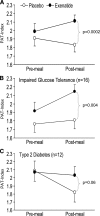Improvement of postprandial endothelial function after a single dose of exenatide in individuals with impaired glucose tolerance and recent-onset type 2 diabetes
- PMID: 20200309
- PMCID: PMC2858168
- DOI: 10.2337/dc09-1961
Improvement of postprandial endothelial function after a single dose of exenatide in individuals with impaired glucose tolerance and recent-onset type 2 diabetes
Abstract
Objective: Endothelial dysfunction is frequently present in individuals with insulin resistance or type 2 diabetes and can be induced by high-fat or high-carbohydrate meals. Because exenatide reduces postprandial glucose and lipid excursions, we hypothesized that it may also improve postprandial endothelial function.
Research design and methods: In a double-blinded randomized crossover design, postprandial endothelial function was examined in 28 individuals with impaired glucose tolerance or recent-onset type 2 diabetes after a single injection of exenatide or placebo given just before a high-fat meal. Endothelial function was determined with peripheral arterial tonometry pre- and postprandially.
Results: Postprandial endothelial function was higher after exenatide compared with placebo (P = 0.0002). In the placebo phase, postprandial change in endothelial function was inversely associated with mean postprandial concentrations of triglycerides (r = -0.62, P = 0.0004). Changes in postprandial triglyceride concentrations explained 64% of exenatide's effect on postprandial endothelial function.
Conclusions: Exenatide ameliorates postprandial endothelial dysfunction after a high-fat meal.
Trial registration: ClinicalTrials.gov NCT00974272.
Figures

References
-
- Ceriello A, Taboga C, Tonutti L, Quagliaro L, Piconi L, Bais B, Da Ros R, Motz E: Evidence for an independent and cumulative effect of postprandial hypertriglyceridemia and hyperglycemia on endothelial dysfunction and oxidative stress generation: effects of short- and long-term simvastatin treatment. Circulation 2002; 106: 1211– 1218 - PubMed
-
- Edwards CM, Stanley SA, Davis R, Brynes AE, Frost GS, Seal LJ, Ghatei MA, Bloom SR: Exendin-4 reduces fasting and postprandial glucose and decreases energy intake in healthy volunteers. Am J Physiol Endocrinol Metab 2001; 281: E155– E161 - PubMed
-
- Kolterman OG, Buse JB, Fineman MS, Gaines E, Heintz S, Bicsak TA, Taylor K, Kim D, Aisporna M, Wang Y, Baron AD: Synthetic exendin-4 (exenatide) significantly reduces postprandial and fasting plasma glucose in subjects with type 2 diabetes. J Clin Endocrinol Metab 2003; 88: 3082– 3089 - PubMed
-
- Cervera A, Wajcberg E, Sriwijitkamol A, Fernandez M, Zuo P, Triplitt C, Musi N, DeFronzo RA, Cersosimo E: Mechanism of action of exenatide to reduce postprandial hyperglycemia in type 2 diabetes. Am J Physiol Endocrinol Metab 2008; 294: E846– E852 - PubMed

